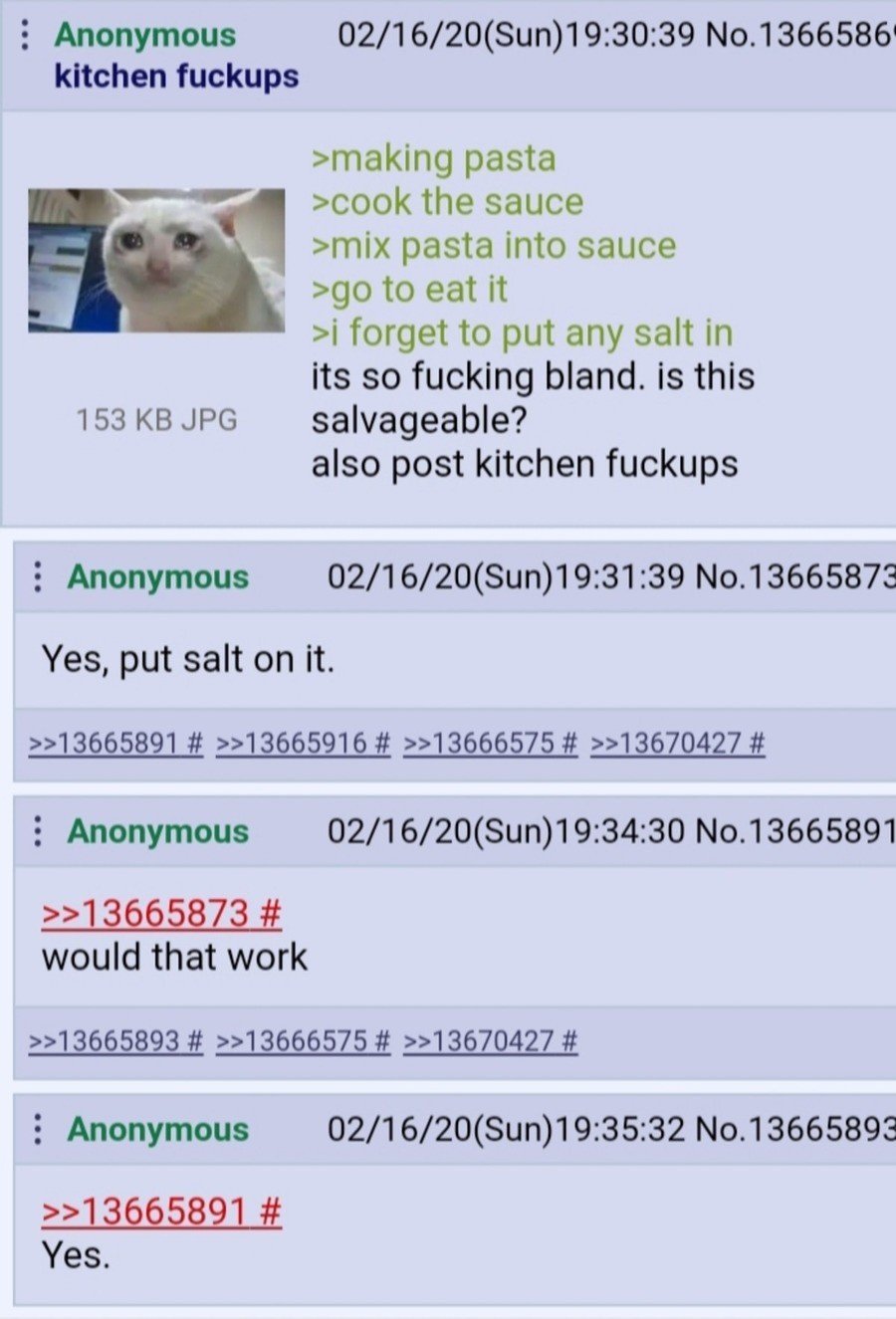this post was submitted on 22 Nov 2024
755 points (99.2% liked)
Greentext
4959 readers
2190 users here now
This is a place to share greentexts and witness the confounding life of Anon. If you're new to the Greentext community, think of it as a sort of zoo with Anon as the main attraction.
Be warned:
- Anon is often crazy.
- Anon is often depressed.
- Anon frequently shares thoughts that are immature, offensive, or incomprehensible.
If you find yourself getting angry (or god forbid, agreeing) with something Anon has said, you might be doing it wrong.
founded 1 year ago
MODERATORS
you are viewing a single comment's thread
view the rest of the comments
view the rest of the comments

If you forget to salt the pasta water, there's no way of making it taste as if you had. And even if the salt dissolves well in the sauce, it won't permeate whatever chunky things there might be in the sauce as if you'd salted a lit bit every step of the way. But yeah, it'll be ok, even if it won't be as good as it would have been. (I know you didn't say it would be the same, just wanted to add).
I never salt my pasta water, and don't miss it. It's uncessary salt when the pasta and sauce have plenty anyway
You've momma'd your last mia! /$
Salt in pasta water does not affect taste
It absolutely does. It will salt the noodles themselves, but you need a very healthy amount, not just a few pinches.
You can use less salt if you use less water. I only add enough salt so that the water tastes as salty as broth.
Also pasta cooks just fine in a shallow pan of boiling water, you only need enough water to cover the top of the amount of pasta your cooking. Remember to stir it a few times though, or it clumps up.
(This is the best way to cook pasta if you are poor and live in a damp/poorly ventelated building. Boiling litres of water per serving is inefficient and expensive, and it makes your kitchen mouldy.)
This is the best way of getting sauces to stick as well. The concentrated pasta water left over at the end is great for making mac and cheese for example. Much better than a few teaspoons of pasta water from a large pot as is usually recommended.
Well well, I am about to make mac and cheese for Thanksgiving.
That still sounds like a healthy serving of salt, definitely more than a few pinches.
Nah, only one usually. And not a big one at that.
Yup. I grab my salt can and do about two sprinkle passes and it seems to turn out pretty good. It's probably around a teaspoon (maybe more) per bag of pasta.
Oh, and use a bit of that pasta water in the sauce, that helps.
Source? This seems almost impossible
If you put a tiny sprinkling of salt in it instead of making it "salty like the sea," you won't notice.
Breaking news! If you under-season your food, you won't taste the seasoning!
You just aren't putting enough salt in? Literally made pasta two days ago and upon eating my first thought was "damn I almost oversalted the pasta water" because the noodles were in fact, salty
Don't tell my Italian gf that, she'd hold it against you for eternity.
And she'd be right.
Yeah you put salt in pasta water to change the properties of the water so it boils differently, not to flavor the pasta lmao
You don’t want to change the flavor of your pasta by over salting the water, that’s just gross.
Not really. Salt in the water is mostly for flavor, the raise in boiling point is so miniscule by the amount added it's practically ignorable.
Adding oil breaks surface tension so that it's less likely to foam over.
Yup. Don't oversalt, but certainly add a healthy amount to the water. Some of that salt gets absorbed into the pasta, which gives it a richer flavor.
I personally bring the water to a boil, add pasta, and then add salt (to keep temps as high as possible), but I highly doubt the order here matters at all.
Yeah the only rule I know is don't add the salt to a cold pan with cold water as heating it up may cause it to damage the bottom of your pan. But adding salt at any point while the water is hot and you aren't done cooking the pasta is pretty safe.